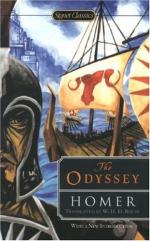As she spoke, she told Eumaeus to set the bow and the pieces of iron before the suitors, and Eumaeus wept as he took them to do as she had bidden him. Hard by, the stockman wept also when he saw his master’s bow, but Antinous scolded them. “You country louts,” said he, “silly simpletons; why should you add to the sorrows of your mistress by crying in this way? She has enough to grieve her in the loss of her husband; sit still, therefore, and eat your dinners in silence, or go outside if you want to cry, and leave the bow behind you. We suitors shall have to contend for it with might and main, for we shall find it no light matter to string such a bow as this is. There is not a man of us all who is such another as Ulysses; for I have seen him and remember him, though I was then only a child.”
This was what he said, but all the time he was expecting to be able to string the bow and shoot through the iron, whereas in fact he was to be the first that should taste of the arrows from the hands of Ulysses, whom he was dishonouring in his own house—egging the others on to do so also.
Then Telemachus spoke. “Great heavens!” he exclaimed, “Jove must have robbed me of my senses. Here is my dear and excellent mother saying she will quit this house and marry again, yet I am laughing and enjoying myself as though there were nothing happening. But, suitors, as the contest has been agreed upon, let it go forward. It is for a woman whose peer is not to be found in Pylos, Argos, or Mycene, nor yet in Ithaca nor on the mainland. You know this as well as I do; what need have I to speak in praise of my mother? Come on, then, make no excuses for delay, but let us see whether you can string the bow or no. I too will make trial of it, for if I can string it and shoot through the iron, I shall not suffer my mother to quit this house with a stranger, not if I can win the prizes which my father won before me.”
As he spoke he sprang from his seat, threw his crimson cloak from him, and took his sword from his shoulder. First he set the axes in a row, in a long groove which he had dug for them, and had made straight by line. {162} Then he stamped the earth tight round them, and everyone was surprised when they saw him set them up so orderly, though he had never seen anything of the kind before. This done, he went on to the pavement to make trial of the bow; thrice did he tug at it, trying with all his might to draw the string, and thrice he had to leave off, though he had hoped to string the bow and shoot through the iron. He was trying for the fourth time, and would have strung it had not Ulysses made a sign to check him in spite of all his eagerness. So he said:
“Alas! I shall either be always feeble and of no prowess, or I am too young, and have not yet reached my full strength so as to be able to hold my own if any one attacks me. You others, therefore, who are stronger than I, make trial of the bow and get this contest settled.”




